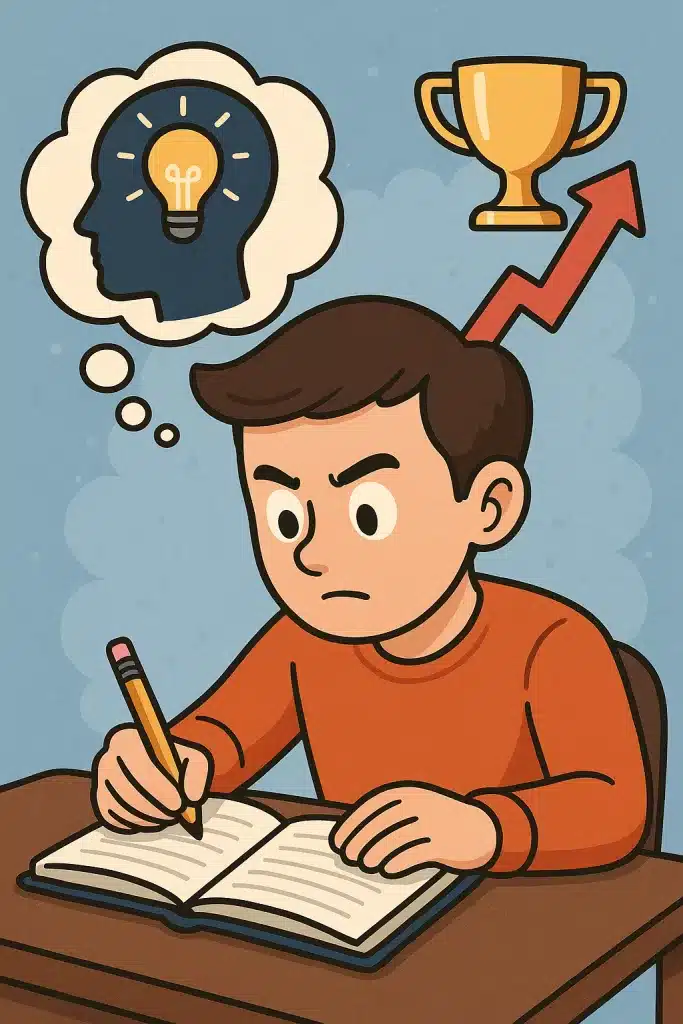Focused thought processes can transform your career trajectory and personal success. When you channel your mental energy into structured, intentional thinking, you unlock a multiplier effect: deeper problem solving, better creativity, and sustained performance.

Why focused thought processes matter now
In today’s hybrid and always‑online workplace, productivity is often mistaken for busyness. Meetings, notifications, and constant digital activity create a false sense of progress—what experts call “performative productivity”. Instead, real progress comes from focused thought processes that protect energy and outcome over visibility.
Psychologists show that an hour of deeply focused work can be up to 500% more effective than fragmented attention driven by multitasking and distraction. Reducing task‑switching also saves as much as 40% of productive time.
Emerging trends supporting focus
1. The rise of micro‑efficiencies
Influencers like James Clear promote small, daily adjustments—micro‑efficiencies—that free up mental bandwidth for deeper thought. These habits can streamline routines and reduce cognitive waste.
2. Deep work and async workflows
Thought leaders emphasize replacing meeting overload with structured async collaboration. This shift supports uninterrupted blocks of focused cognitive work rather than constant digital chatter.
3. Attention‑management tools
Mindfulness, digital detox, and time‑blocking apps help counter “continuous partial attention”—the tendency to scan constantly for updates and interruptions which reduces depth of focus.
How focused thought processes translate to personal success
Clear goal setting
Use frameworks like the Eisenhower Matrix and Oliver Burkeman’s 3‑3‑3 rule to define priorities each day and minimize reactive, low‑impact tasks.
Mindset shifts
Adopting a growth mindset—believing skills grow through effort—enhances willpower and endurance during complex problem solving.
Mindfulness and cognitive control
Programs such as 8‑week mindfulness interventions in IT professionals have shown measurable improvements in self‑awareness, stress reduction, and perceived productivity.
Practical guide: Build focused thought habits
Step 1: Identify Your Productivity Peaks
Use time-tracking or journaling to find when your energy is highest—morning, afternoon, or evening—and schedule critical thinking tasks then. Track your mental clarity every 2 hours for a week, rating it 1-10. Look for consistent patterns and protect these peak windows for your most important cognitive work while using low-energy times for routine tasks.
Step 2: Time-Block Deep Focus
Reserve fixed blocks (e.g. 90 minutes) with no notifications for focused work. Research shows it takes 23 minutes to regain focus after interruption, so eliminate all distractions: phone in airplane mode, notifications off, email closed. Use website blockers if needed. Alternate with short screen breaks or physical movement to help your brain recover between sessions.
Step 3: Design Async Work Routines
Limit synchronous calls. Use shared documents, recorded updates, and clear agendas to reduce context-switching and preserve focus time. Replace routine meetings with asynchronous updates and batch communication into 2-3 designated windows daily rather than responding constantly throughout the day.
Step 4: Leverage Micro-Efficiencies
Batch routines, prep tasks, and declutter environments (e.g., multiple glasses, prep breakfasts ahead) to avoid decision fatigue and free brain power for creative tasks. Create templates for recurring decisions like standard email responses and meal planning. Prepare your workspace before focus sessions to eliminate startup friction.
Step 5: Train Your Attention
Use meditation, guided mindfulness apps, or body-doubling (working alongside someone quietly) to build mental stamina and reduce reactivity to distraction. Start with 10 minutes of daily breath-focused meditation using apps like Headspace or Calm. Gradually increase focus session duration from 20 minutes, adding 5-10 minutes weekly as your attention span strengthens
Real-world impact: personal and career wins
Higher-quality output: Focused, deep thought leads to more innovative solutions and impactful deliverables. When you protect cognitive resources, you create space for breakthrough thinking that connects disparate ideas and produces genuinely novel insights. Each high-quality deliverable builds your reputation and serves as a foundation for more sophisticated work.
Sustained energy: Protecting attention prevents burnout and discourages task masking—where busyness masks emptiness in deliverables. Burnout often stems from constant context-switching rather than long hours. When you’re always jumping between tasks, your brain never gets the satisfaction of deep completion. Protected focus time creates self-sustaining energy through meaningful progress.
Career recognition: Prioritizing outcome-oriented thinking can boost performance reviews, influence hiring decisions, and enhance reputation as a strategic thinker. Consistently producing work that shows strategic thinking—connecting contributions to business objectives, anticipating effects, proposing root-cause solutions—positions you as leadership material. This reputation compounds: executives think of you for complex challenges, and career opportunities naturally follow.
Common pitfalls — and how to avoid them
| Mistake | How to fix it |
|---|---|
| Too many distractions | Set distraction-free work blocks with no tech interruptions |
| Over-optimization focus traps | Don’t obsess over every micro-hack; aim for habits that free meaningful time, not just seconds of convenience |
| Lack of organizational buy-in | Advocate for system changes—simplify workflows, reduce unnecessary meetings, support deep thinking across teams |
Organizations are slowly responding: Deloitte reports that 61% of managers and 72% of workers don’t fully trust existing performance systems—and few organizations use data-driven approaches to build trust and meaningful focus-driven performance systems.
Why it matters in 2025 and beyond
- AI automation: Generative AI offers 4.4 trillion US dollars in productivity gains—but only when human focus is aligned with high-level thinking, not fragmented activity.
- Standout productivity: According to McKinsey, a small number of companies generate most economic productivity via bold strategic focus. Personal success mirrors that: standout individuals aren’t just busy—they pursue high-impact, focused thinking.
Focused Thought Processes Improve Personal Success: Summary
- Why it matters: deep thought dramatically boosts efficiency and creativity.
- Supportive trends: micro-efficiencies, async work, attention-management tools.
- Practical steps: identify peaks, time‑block, reduce distractions, train attention.
- Benefits: higher-quality work, sustained energy, better career positioning.
References
Fox, K. C. R., Dixon, M. L., Nijeboer, S., Girn, M., Floman, J. L., Lifshitz, M., Ellamil, M., Sedlmeier, P. & Christoff, K. (2016). Functional neuroanatomy of meditation:. https://arxiv.org
Harvard Health Publishing. (2024‑2025). Mindfulness practice for focus. Harvard Health. https://www.health.harvard.edu
MacKenzie, L.; et al. (2023). Mindfulness and its relationship to academic achievement among higher education students. https://www.frontiersin.org






